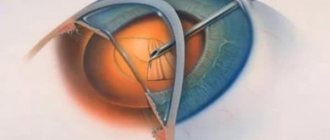Prozac is an original antidepressant drug developed by a Swiss pharmaceutical company. The drug is used to treat depression and other conditions associated with psycho-emotional disorders. Before using Prozac, you should definitely read the instructions for use, since improper use can lead to serious complications.
Mechanism of action
Prozac slows down the uptake of serotonin. The active substance does not react with other compounds. This suggests that the drug does not interact with cholinergic, adrenergic, histamine and dopaminergic receptors.
An antidepressant affects serotonin levels. Thanks to this, dysphoria is relieved, fear, anxiety and tension are relieved. The active ingredient does not affect the functioning of the myocardium. It should be noted that there is no sedative activity. The risk of orthostatic hypotension is minimal.
Prozac can only be prescribed by your doctor. The drug has a long-lasting effect. The maximum concentration of the active substance in the patient’s blood is recorded 7-8 hours after taking a single dose. The medication can be taken either once or throughout the course. The drug composition is excreted through the urinary system.
Which is better: Prozac or Fluoxetine
The pharmaceutical market offers a wide range of Russian generics of Prozac - Fluoxetines. These are tablets containing an identical active ingredient, but differing in production technology and composition of auxiliary ingredients. Prozac and domestic fluoxetine have almost identical instructions for use, but differ significantly in price. Fluoxetine is usually 5-10 times cheaper than Prozac.
The forums actively discuss the question of what is better: the original drug or generics. Many patients note that Prozac causes fewer side effects and is generally better tolerated. The highest quality generic is considered to be the Austrian Fluoxetine Lannacher, which also rarely provokes complications. This difference is likely due to better purification of medicinal raw materials and auxiliary components, which are subject to mandatory certification in Europe. Other patients do not see any significant difference between these drugs at all and prefer the cheaper Fluoxetine.
Contraindications
Prozac is relatively safe. However, it is strictly forbidden to be taken by minor patients or persons with a history of hypersensitivity to the ingredients of the composition.
Particular caution should be exercised when prescribing an antidepressant to patients with suicidal tendencies. Factors that aggravate this condition include severe depression and sleep problems. Relative contraindications include old age, diabetes, epilepsy, liver and kidney diseases. The absolute ones include glaucoma, convulsive syndrome, and benign prostatic hyperplasia. Severe psychomotor agitation can provoke the development of negative manifestations.
Pregnant women are prescribed a medicine if the expected benefit is greater than the possible risk. If the capsules were prescribed to a woman in the last months of pregnancy, the doctor should regularly monitor the condition of the fetus, and subsequently the newborn child. This is due to the fact that fluoxetine penetrates the placental barrier and into breast milk.
Consequences of taking Fluoxetine
Not a single poison (drug) can be used without consequences. Fluoxetine is dangerous and leads to negative changes:
- Paranoia;
- Convulsions;
- Muscle atrophy and anorexia;
- Increased salivation;
- Urinary and fecal incontinence;
- Rash;
- Sexual dysfunctions;
- Anemia;
- Blood clots, arrhythmia and the risk of heart attacks.
Overcoming Prozac Addiction
Narcology methods in the fight against fluoxetine will only help solve physical problems and will not help cope with a negative emotional (mental) state. The Narconon rehabilitation program will help you get rid of psychological addiction.
It takes into account all aspects of addiction, from the reasons for use to the consequences (mental degradation of a person, depression, negative thoughts).
The Narconon program also teaches a person how to cope with problems and difficulties. A person feels better, has more self-confidence, and can live a full life. And 75% of those who completed the program no longer abuse medications, including Fluoxetine, or alcohol.
Share:
What is hashish?
How much hashish is excreted from the blood and urine
Application procedure
Prozac is taken orally. Capsules are taken whole; their shell should not be damaged. The drug is taken with a sufficient amount of liquid. Juices, tea, coffee and soda will not work. Prozac can be taken both before and after meals. The daily dosage depends on the diagnosis:
- depression – 20 mg;
- bulimia arising from nervousness – 60 mg;
- compulsive disorders – from 20 to 60 mg.
The standard dosage is adjusted based on the patient’s well-being and his individual characteristics. Prozac should be started after the course of MAO inhibitors has been completed.
Prozac for weight loss
Prozac is used for weight loss only for bulimia and psychogenic overeating. In such patients, due to stress, their appetite increases, they can eat large amounts of high-calorie food at a time and quickly gain weight. By stabilizing the psycho-emotional state, Prozac dulls the feeling of hunger and normalizes eating behavior.
Instructions: use for weight loss
The average dose of Prozac for the treatment of bulimia is 20 mg 2-3 times a day. The dosage is selected individually, as is the duration of therapy. Patients with severe obesity usually require a higher concentration of the active substance. In any case, you can drink no more than 80 mg of medication per day. Increasing and decreasing the dose is carried out gradually, according to general rules.
Results and reviews of those losing weight
The opinions of patients who took the drug for weight loss vary. People suffering from bulimia note that they managed to lose weight quite quickly, but for many, after completing treatment, it returned again. Negative reviews are mainly related to the incorrect use of Prozac. Firstly, patients, in an effort to lose weight faster, exceed recommended doses and end up with serious complications. Secondly, some people try to lose weight with Prozac for conditions that are not within its scope. For example, it is completely ineffective for obesity due to hormonal imbalances, metabolic disorders, and diabetes.
Patients note both positive and negative properties of the drug.
Pros:
- good effect in treating bulimia
- fast action
- possibility of long-term use
Minuses:
- ineffectiveness in the treatment of other forms of obesity
- short duration of effect
- frequent development of adverse reactions
In any case, you can take an antidepressant for weight loss only on the recommendation of a doctor.
Side effects
An antidepressant, like other medications, can cause disturbances in the functioning of vital systems:
- Cardiovascular – blood pressure surges, hot flashes, vasculitis.
- Gastrointestinal tract - dyspepsia, stool disorders, changes in taste, dry mucous membranes.
- Central nervous system – severe headaches, nightmares, unreasonable anxiety, seizures.
- Genitourinary – sexual impotence, dysuria, bleeding in the genital tract.
The patient may experience decreased vision, develop psychomotor hyperactivity, myoclonus, and hypomania. An allergic reaction may occur; it is expressed in the form of skin rashes, anaphylactic shock, Quincke's edema, and excessive sweating.
The risk of side effects is reduced if the patient follows the doctor's recommendations and the manufacturer's instructions when undergoing therapy. If the prescribed dosage is exceeded, ventricular tachyarrhythmia, pyrexia, stupor, and arterial hypotension occur. To eliminate the malaise, the patient is prescribed symptomatic therapy.
To prevent a deterioration in general well-being, it is necessary to follow the nuances prescribed in the instructions for use. When treating older people, the daily dose must be adjusted. Patients in this age category have many chronic diseases. The drug regimen includes drugs belonging to different pharmacological groups. Therefore, when prescribing therapy, be sure to take into account the interaction of this medication with other drugs.
It is strictly forbidden to combine Prozac with drinking alcoholic beverages.
You should also limit the time spent driving and at work. The drug has a negative effect on the ability to concentrate. The speed of psychomotor reactions decreases.
Fluoxetine as a drug
Fluoxetine is a drug, a poison. These substances act on the body according to one scheme (depending on the dose):
- A small dose stimulates (metabolism accelerates, a person feels a surge of strength and improved mood);
- The average dose calms (drowsiness, relaxation, poor coordination of movements);
- A large dose kills (overdose).
In the first two cases, the body fights the poison, tries to eliminate it (by speeding up metabolism) or tries to limit consumption (drowsiness and poor coordination). And if he cannot cope with the poison, he dies.
In the instructions you will find a number of side effects from fluoxetine: negative effects on the nervous, digestive and genitourinary systems. Here are some of the consequences:
- Severe irritability;
- Thoughts about suicide;
- Anxiety;
- Dizziness;
- Headache;
- Insomnia or, conversely, drowsiness;
- Nausea;
- Vomit;
- Diarrhea;
- Urinary incontinence;
- Sexual dysfunction;
- Allergies;
- Itching;
- Chills;
- Anorexia;
- Fever;
- Increased sweating and other side effects.
The body gradually gets used to drugs (poisons) and this is reflected in the fact that they cease to have the expected effect and the dose needs to be increased. With Fluoxetine, side effects appear at the beginning of use and when the dose is increased.
Pharmaceutical drugs are often used by drug addicts, or people become drug addicts by becoming addicted to painkillers or antidepressants.
To achieve a narcotic effect, increased doses of Prozac are used. As a rule, if the drug is well absorbed by the mucous membranes, it can be taken through the nose (snorted), and Fluoxetine is 95% absorbed by the gastric mucosa.
Prozac and other drugs
Prozac cannot be combined with Thioridazine and Pimozide. The same applies to medications that slow down the formation of monoamine oxidase. Otherwise, the half-life of fluoxetine will increase significantly. When combining an antidepressant with medications that have similar properties, the toxicity and plasma concentration of phenytoin increases.
Combining Prozac with triptans and serotonergic drugs can cause serotonin syndrome, vasoconstriction, and hypertension. Fluoxetine increases the sedative effect that occurs when taking Alprazolam. The drug should not be included in the therapeutic regimen together with medications that are metabolized via the CYP2 D6 isoenzyme.
When oral anticoagulants and fluoxetine are prescribed simultaneously, the risk of internal bleeding increases. In such a situation, blood clotting levels should be checked regularly. Electroconvulsive therapy is not compatible with Prozac. This is fraught with an increase in the intensity of the convulsive syndrome.
How does fluoxetine work?
As a medicine, this drug has a mild stimulating effect and relieves depression, negative thoughts and feelings.
Drug addicts strive to get a psychostimulating effect (trips, euphoria) from Fluoxetine. It speeds up thinking processes, increases sociability and mood, relieves drowsiness and fatigue, etc.
This medicine enhances the effects of other drugs (fluoxetine and amphetamine, alcohol or smoking weed have a greater effect), and some people are “rushed” by taking it “solo”.
Reviews
Igor Nikolaevich, Kirov : “Prozac is a drug that quickly and effectively relieves anxiety. An endocrinologist prescribed it to me, the reason for this was a deterioration in my psycho-emotional state. The side effects indicated in the annotation did not appear in my case.”
Valery Vladimirovich, St. Petersburg : “I went to see a doctor because of depression. I had a difficult life situation that I could not cope with on my own. The doctor prescribed a comprehensive treatment. Among the prescribed medications was Prozac. Improvement occurred after completing the course. I can’t say which drug helped more than the others.”
Content
Indications for use of Prozac
This drug is prescribed for the treatment of:
- Depression, especially accompanied by fears or not treatable with other drugs;
- In combination with other medications, it is prescribed for uncontrollable food cravings (bulimic neurosis) for weight loss;
- For a mental disorder characterized by fears, obsessive thoughts, memories and actions.
The instructions also contain contraindications, for example, certain pathologies, pregnancy and simultaneous use with certain medications.
Pharmacological properties
Pharmacodynamics
Prozac is an antidepressant. Its active ingredient is fluoxetine, a selective serotonin reuptake inhibitor (SSRI), which determines the mechanism of action of the drug. Due to the suppression of serotonin reuptake, the concentration of serotonin in the synaptic cleft increases, its effect on postsynaptic receptors is enhanced and prolonged. Fluoxetine increases serotonergic transmission through a negative feedback mechanism, thereby inhibiting neurotransmitter metabolism. With prolonged use, Prozac reduces the activity of 5-HT1 receptors. It also blocks the reuptake of serotonin in platelets. The reuptake of dopamine and norepinephrine has little effect. It has no direct effect on other receptors, including H1-histamine, m-cholinergic, serotonin, muscarinic, dopaminergic, GABA and alpha-adrenergic receptors. Unlike most antidepressants, fluoxetine does not reduce the activity of postsynaptic beta-adrenergic receptors.
Prozac is effective for obsessive-compulsive disorders and endogenous depression. The drug reduces anxiety, tension and fear, improves mood, and eliminates dysphoria.
It has anorexigenic properties, so it can cause weight loss. In diabetes mellitus it can cause hypoglycemia, after discontinuation of fluoxetine - hyperglycemia.
The pronounced therapeutic effect of Prozac occurs after 1–4 weeks for depression, after 5 or more weeks for obsessive-compulsive disorders.
There is evidence confirming the effectiveness of fluoxetine in the following cases: eating disorders (bulimia nervosa), anxiety disorders (including social phobia), affective disorders (including bipolar), panic attacks, autism, kleptomania, dysthymia, schizophrenia, schizoaffective disorders, catalepsy, narcolepsy, alcoholism, diabetic neuropathy, obstructive sleep apnea syndrome, premenstrual syndrome, etc.
Pharmacokinetics
After oral administration, fluoxetine is well absorbed from the gastrointestinal tract. When taken simultaneously with food, the absorption of the substance may be delayed by 1–2 hours, but this does not affect its systemic bioavailability. In this regard, Prozac can be taken both with meals and between meals.
Fluoxetine reaches its maximum plasma concentration after 6–8 hours. At concentrations ranging from 200 to 1000 ng/mL, approximately 94.5% of fluoxetine is bound to serum proteins in vitro, including alpha-1-acid glycoprotein and albumin. The drug is characterized by a high volume of distribution - 20–40 l/kg. The maximum concentration is 15–55 ng/ml. Steady-state plasma concentrations can be achieved by taking Prozac for several weeks. With long-term use of the drug, equilibrium concentrations are similar to those at 4–5 weeks of treatment.
After 30 days of taking Prozac at a daily dose of 40 mg, the plasma concentration of fluoxetine varies in the range of 91–302 ng/ml, the concentration of the norfluoxetine metabolite is 72–258 ng/ml.
Approximately 7% of the population has reduced activity of the cytochrome P450 2D6 isoenzyme (CYP2D6 isoenzyme), which metabolizes fluoxetine. These patients are called "poor metabolizers" of drugs such as dextromethorphan, debrisoquine, and tricyclic antidepressants (TCAs). During the study, patients were administered labeled and unlabeled enantiomers as a racemic mixture. It was found that the metabolism of S-fluoxetine was slower and, as a result, the concentration of the substance was higher. Accordingly, in the equilibrium state the concentration of S-norfluoxetine was lower. The metabolism of R-fluoxetine in these patients was normal. In poor metabolizers, compared with normal metabolizers, the total sum of steady-state plasma concentrations of the four active enantiomers was not significantly higher, so the overall pharmacological activity of Prozac is almost the same. Also, the metabolism of the active substance occurs through alternative unsaturated pathways (excluding the 2D6 isoenzyme), which explains the ability of fluoxetine to reach an equilibrium state instead of an unlimited increase in concentration.
Since the CYP2D6 isoenzyme system is involved in the metabolism of fluoxetine, drug interactions may develop with the simultaneous use of other drugs that are also metabolized by this enzyme system (for example, tricyclic antidepressants).
The half-life (T½) of fluoxetine is 4–6 days, and that of norfluoxetine is 4–16 days. Due to the T½ duration, the drug persists for 5–6 weeks after the end of treatment. It is excreted mainly through the kidneys - about 60%.
Special patient groups:
- elderly patients: the pharmacokinetic parameters of fluoxetine are comparable to those in younger patients;
- renal failure: after a single dose of Prozac in patients with renal failure, kinetic parameters were similar to those in healthy volunteers, however, after repeated administration of fluoxetine, an increase in the plasma concentration plateau is possible;
- liver failure: the half-life of fluoxetine and norfluoxetine increases to 7 and 12 days, respectively (lower doses of Prozac or increased intervals between doses are recommended).
When to use?
As can be seen from the instructions, the indications for using Prozac are as follows:
- neurosis;
- depression;
- psychosis;
- alcoholism;
- incorrect eating behavior;
- PMS and mood swings associated with this period;
- schizophrenia;
- TIR;
- OCD.
As was discovered during medical practice, Prozac can show good results in the treatment of persistent severe headaches, the cause of which cannot be identified.
Signs of drug abuse
Failure to comply with the dosage recommended by the manufacturer or frequent use of an antidepressant will cause certain symptoms indicating abuse. If you take an antidepressant excessively, the following consequences are observed:
- Psychological arousal (severe nervousness, aggressiveness, a pronounced feeling of joy, etc.).
- Excessive physical activity (identical to the use of psychostimulants).
- Disturbed thinking.
- Convulsions strongly reminiscent of epileptic convulsions.
- Increased heart rate and elevated blood pressure.
- Periodic appearance of gag reflexes.
Very often, drug addicts combine it with other intoxicating substances, without even realizing how dangerous it is. Such “explosive mixtures” can cause disability or death even after the first use.
What if there is too much?
An overdose of Prozac is manifested by disorders in the gastrointestinal tract: nausea, vomiting, and stool disturbances. The human psyche also reacts negatively to an excess of fluoxetine in the body - the state becomes agitated, convulsions reminiscent of epileptic attacks are possible.
No special therapy has been developed for overdose. It is necessary to perform gastric lavage and give the patient activated charcoal. If convulsions begin, use drugs from the group of tranquilizers.
Interaction
Prozac is:
- incompatible with MAO inhibitors - after stopping taking MAO inhibitors, at least 14 days must pass before starting a course of Prozac, while discontinuation of fluoxetine allows you to take inhibitors only after 5 weeks;
- a drug that can change the concentration of lithium in the blood;
- combination with the amino acid tryptophan and the antiepileptic drug Phenytoin increases the risk of adverse reactions.
Long-term therapy: what do the reviews say?
Prozac, according to many patients, is not the most effective remedy. As the patients who completed the course noted during the research, at first the condition improved, but over time the reverse process occurred. With long-term use, all those undergoing treatment experienced a loss of interest in life, including important and joyful moments. According to non-specialists, a person “becomes a vegetable” and cannot experience emotions. Is Prozac sold in pharmacies with a prescription or not? Due to the abundance of the mentioned negative responses and wide public outcry, the antidepressant, which was sold freely at first, is now sold strictly with a prescription from the attending physician.
Depression: is it a disease?
Since several high-profile studies (the accuracy of which is still disputed by a number of experts) have shown that the use of Prozac increases the likelihood of a suicide attempt on the part of the patient, the very fact of depression has attracted public attention. As it soon became clear, almost all modern people exhibit it to one degree or another. True, due to the advertising campaign for medications, as well as the love of journalists for inflated sensations from a clinical diagnosis, depression first turned into a term for denoting a bad mood, and then completely depreciated. Modern self-respecting domestic psychiatrists never make such a diagnosis; it can only be heard from a psychologist or psychotherapist.
If the coin has a reverse side. Yes, people may not suffer from a real mental illness, but simply want to attract attention to themselves, which is why they find themselves depressed. But next to him there are a huge number of people who actually have mental disorders. These people need help, trust from society, but all they receive is ridicule associated with the diagnosis of depression. This depresses the patient's condition. As a result, the frequency of suicide attempts is increasing from year to year, many of which are successful.
Can antidepressants cause addiction, and what are the side effects of fluoxetine?
Antidepressants increase the risk of suicidal ideation and behavior in children, adolescents, and young adults in short-term studies. Patients of all ages who are initiated on antidepressant therapy should be closely monitored for worsening symptoms and the emergence of suicidal thoughts and behavior. It is necessary to carefully observe and communicate with your doctor.
Get emergency medical help if you have signs of an allergic reaction to fluoxetine.
Tell your doctor about any new or worsening symptoms, such as:
- Changes in mood or behavior;
- Anxiety;
- Panic attacks;
- Sleep disturbance.
In addition to sudden weight gain or loss, fluoxetine for depression can cause a feeling of euphoria, which can lead to abuse and addiction.
Reviews from patients and doctors about the antidepressant
Most doctors who use antidepressants in their practice give positive reviews of Prozac, noting its effectiveness and relative safety. Although many experts indicate that in severe depression its effect is not enough. Treatment with antidepressants is usually combined with psychotherapy.
There are more negative reviews of Prozac among patients. They note frequent side effects, mainly related to sleep disorders, overexcitation, headaches, and digestive disorders. Patients are often afraid to take Prozac, considering it a drug, and at the slightest negative manifestations they stop taking the medicine on their own. This tactic is inherently wrong. The drug is not a narcotic, and most unwanted reactions go away after a few days of use. Many patients are also dissatisfied with the high cost of the medication and the need for long-term use.
Among the advantages of Prozac are:
- good effect in the treatment of mild to moderate depression, bulimia
- relatively fast onset of action
- elimination of obsessive states
- psychostimulating effect, mood improvement.
There are also quite a few disadvantages:
- frequent adverse reactions
- high price
- long course of treatment
- packaging is too small
- sale and dispensing from pharmacies with a prescription.
Remedy for the blues
Prozac was the first antidepressant in the history of our planet. It was he who became the progenitor of a huge number of similar drugs, which grew into an incredibly influential pharmacological industry, the activities of which are based on promising people mental stability and even happiness. However, other reviews about Prozac are less positive - a number of experts are convinced that it was this drug that gave birth to depression as a disease, because, as you know, a little over three decades ago no one could even imagine the existence of such a diagnosis.
And Prozac was not created for this purpose at all, but as part of the development of a drug to correct high blood pressure. The side effect was discovered in additional clinical studies. As it became clear from the group of subjects, when taking Prozac capsules their mood improved. Later this was called stabilization of the mental state, and the medication itself was dubbed a remedy for mild depressive disorders.
Overdose
Taking excessive doses may cause the following reactions:
- convulsions;
- drowsiness;
- vomit;
- nausea;
- tachycardia , prolongation of the QT interval or ventricular tachyarrhythmia , up to cardiac arrest ;
- delirium;
- coma;
- mania , fainting , stupor , pyrexia .
The minimum lethal dose of fluoxetine as a single dose was 520 mg, but a clear cause-and-effect relationship was not established.
A specific antidote is unknown. Treatment is carried out by monitoring the general condition and cardiac activity, conducting general symptomatic and supportive therapy.
Other diagnoses
To get rid of mood swings provoked by the approach of menstruation, drink one Prozac capsule containing 20 mg of the active ingredient every day. To eliminate acute symptoms of mental illness, Prozac is prescribed in the same dosage as a maintenance drug.
When treating bulimia, take 20 mg of fluoxetine three times a day. For neurosis, when obsessive thoughts are detected, the patient takes 20-60 mg of the drug per day. The specific volume depends both on the severity of symptoms and on the effectiveness of medical therapy. The body’s reaction is not always clearly predictable, so it is impossible to immediately predict what volume will show the desired results.
When is it not possible?
The manufacturer points out that Prozac should not be used if:
- suicidal attempts, corresponding mood;
- chronic renal failure;
- intolerance to any of the components of the drug (manifests individually);
- liver failure in the stage of decompensation.
Prozac is prohibited for use by women during pregnancy and breastfeeding.
The drug can be used with caution and with regular monitoring of the patient's condition in cases of diagnosed diabetes mellitus, impaired renal and liver function, patients with epilepsy with a history of epileptic seizures, as well as elderly patients. Prozac is not recommended for the treatment of people who have been diagnosed with anorexia, as well as those with a naturally asthenic body type.











